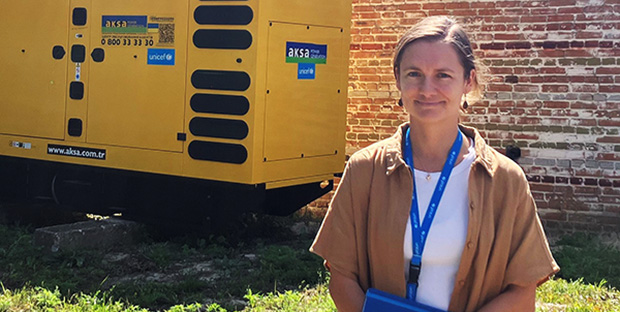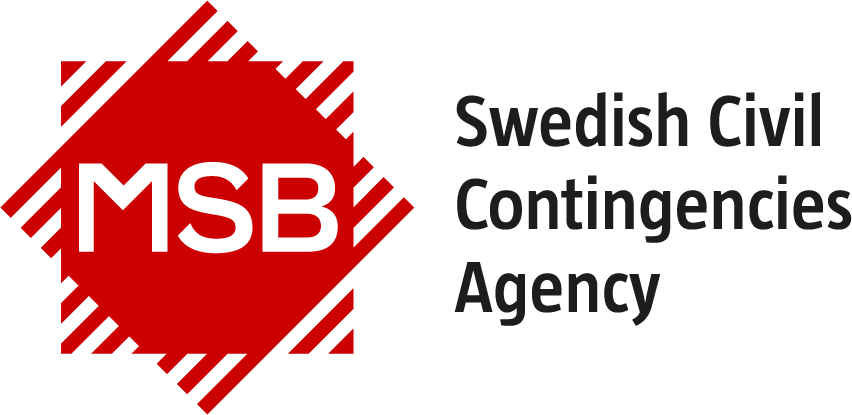Keeping the water flowing for every child amid war in Ukraine
Emma Lundin tells about her mission as a WASH (Water, Sanitation and Hygiene) engineer seconded to UNICEF in Ukraine and her personal experience of being deployed to a high-risk context.

Living in Ukraine’s capital Kyiv during wartime comes with many experiences and emotions.
On a Saturday evening you can be sitting on your neighbour’s couch with a glass of wine, having a foot spa, and watching an old comedy from the 90’s. Then, a few hours later in the early morning you’re on the floor in the basement of your building watching your feet. Still in heart-covered foot-wrappers, but squeezed into your flipflops. It’s something to rest your eyes on when your brain is half asleep and you can still hear the drones buzzing overhead.
It becomes the new normal. I’ve had some terrifying nights, but I’ve learnt what I can and need to do to feel safe. And despite the war, in Kyiv everything works and it’s a fantastic city! MSB has seconded me as a Water and Environmental Engineer to UNICEF Ukraine. Here I am working under the title of Urban WASH Recovery Coordinator. I feel so privileged to contribute and to work with UNICEF not only on the emergency response, but with long-term recovery efforts.
Access to water and sanitation for every child is the mandate and goal. In my role, I coordinate UNICEF’s support for the rebuilding of Ukraine's water and wastewater infrastructure – work that directly impacts the delivery of essential services for millions of families and children.
Massive needs and challenges
The scale is staggering. Through our work with local partners and vital international partnerships, we’re restoring and improving water and sanitation services to 5.7 million people. That’s just the first phase; another 1.3 million people are targeted for the second phase. It’s critical work with the total WASH sector damage reaching a staggering US$4.6 billion with daunting reconstruction challenges ahead. Largest investment needs to focus on sewage treatment plants and water supply networks.
But this isn't just about fixing pipes – it's about rebuilding the foundation of public health and human dignity in communities affected by the war. And everyone is affected in one way or another. Energy prices have skyrocketed, prices on chemicals for water treatment as well, but the water tariff is locked low under Martial law to protect low-income families, meanwhile the income to the water utility companies doesn’t even cover their energy costs.
200 projects across Ukraine
UNICEF’s recovery programme involves over 200 projects across the country, from emergency repairs to innovative pilot programmes testing scalable solutions. Right now, I'm overseeing the production and installation of self-cleaning screens for wastewater treatment plants – seemingly simple technology that becomes incredibly complex when you're working in 13 different locations, each with unique challenges and security considerations.
I’m also inspired to take part in developing and documenting "scalable models" - around 15 pilot projects testing new approaches that could transform how Ukraine rebuilds its infrastructure. We're exploring robotic tele-inspection cameras for pipe assessments and energy-efficient solutions powered by solar panels and batteries to keep critical systems running even when the power grid fails. It isn't just about rebuilding – it's about building back better and Ukraine reaching EU standards.
The greatest challenge for the Ukrainian water utility companies might however be the constant adaptation required. The organizations are struggling with finding work force as men are conscripted to the military. Staff work under conditions no engineer's training really prepares you for. They risk their lives by carrying out emergency repairs, while supply chains are disrupted or complicated. Yet the Ukrainian water utility workers keep showing up no matter what the challenge is, and they also have their own families to worry about. But they do what they can to keep the water flowing to households and for essential services, such as health and educational facilities.
Across the country
The work takes me across the country. I’ve travelled to Poltava, where I visited water and sanitation networks that UNICEF has helped to restore with the local water utility and I’ve seen and heard how we’re building their capacity to seek investments for the future. Essentially, it’s about maintaining access today and building a more efficient and effective service for the years to come. I’ve been to Odesa and Mykolaiv where new programmes are coming to life, including the use of renewable energy, as well as to Lviv in the west for security training.
What keeps me motivated is knowing that the impact of our work will outlast the war. I decided to go to Ukraine with the hope to somehow support its people under the heavy pressure of this horrible war. The water networks we're rebuilding, the innovative systems we're piloting, the local capacity we're strengthening - these will serve Ukrainian children and families for generations to come and is essential for the functioning of any human society. In those stressful moments in the shelter, listening to drones overhead, I don’t question why I’m here, as weird as it may seem.
Emma Lundin
